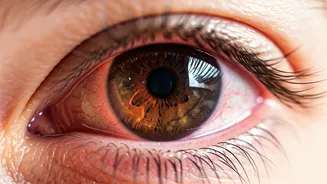Understanding Burning Eyes
Burning eyes can be caused by various environmental irritants that affect the eyes. The sensation of burning can range from mild discomfort to intense
pain. Several factors can lead to this issue, including environmental elements, underlying medical conditions, and lifestyle habits. It is important to identify the cause to find the best way to solve the issue. Burning eyes can disrupt daily activities and affect the quality of life if left unaddressed. Understanding the underlying reasons is crucial for effectively addressing and managing the issue. There are many strategies, starting with simple remedies and moving to more intensive treatments, depending on the severity and cause of the irritation. Getting the proper medical advice helps avoid complications, which can lead to vision problems. Therefore, recognizing the signs and symptoms and knowing when to seek professional medical attention is essential for preserving eye health.
Dry Eyes as Culprit
Dry eyes are a frequent culprit behind the burning sensation. Dryness occurs when the eyes do not produce enough tears or when the tears are of poor quality. This can happen because of aging, prolonged screen time, environmental conditions, or certain medications. The environment plays a huge role in causing dry eyes, and being in a dry environment can increase tear evaporation. Likewise, air conditioning and heating can exacerbate the situation, leading to increased dryness and burning sensations. People who spend a lot of time staring at digital screens are more prone to dry eyes. It leads to reduced blinking, causing the eyes to dry out faster. Addressing dry eyes involves using artificial tears, which lubricate the eyes. Humidifiers help to add moisture to the air and can make the symptoms better. Additionally, making sure to blink frequently and taking breaks from screens are practical ways to manage dry eye symptoms.
Allergies and Irritants
Allergies are another significant contributor to burning eyes. Airborne allergens, such as pollen, dust mites, and pet dander, can irritate the eyes. When allergens come into contact with the eyes, they trigger the release of histamine, leading to inflammation, itching, and burning. Environmental irritants, like smoke, pollution, and certain chemicals, can also cause burning sensations. These substances can directly irritate the eye's surface, resulting in discomfort and redness. Avoiding exposure to allergens and irritants is an important step. Using air purifiers can reduce exposure to airborne particles. Using protective eyewear, like sunglasses, can help prevent contact with irritants. Furthermore, using allergy medications, such as antihistamines, can relieve allergy symptoms. If the symptoms persist or worsen, consider consulting a medical professional for advice.
Habits to Avoid
Certain habits can make burning eyes worse and should be avoided or modified. One of the primary culprits is extended screen time without taking breaks. Staring at screens for long durations without blinking regularly can lead to dry eyes and heightened irritation. Another key habit to manage is improper use of contact lenses. Contact lenses should be cleaned and replaced as directed. Sleeping with contact lenses and not cleaning them properly can increase the risk of eye infections and irritation. Likewise, rubbing your eyes can exacerbate the issue. Rubbing your eyes can introduce more irritants and inflame the eyes. It is also important to consider environmental factors, such as air quality. Smoking and exposure to smoke can irritate eyes and worsen the burning sensation. Make sure you avoid these bad habits to keep your eyes healthy and to eliminate the burning sensation.
When to Seek Help
Recognizing when burning eyes need medical attention is essential for protecting eye health. If your burning eyes are accompanied by severe pain, vision changes, or sensitivity to light, it is necessary to consult a healthcare professional. These symptoms may suggest a more serious condition, like an infection or inflammation. If the symptoms persist despite home remedies, or if they worsen, seeing a doctor is advisable. A healthcare professional can diagnose the underlying cause of the issue and suggest specific treatments. If you experience discharge from your eyes, especially if it is thick or discolored, you should seek medical help. This may indicate an infection. Additionally, any sudden changes in vision should prompt immediate medical attention. Early intervention can prevent potential complications and safeguard long-term vision. Overall, you should seek the help of a professional if you feel that your condition is getting worse.












